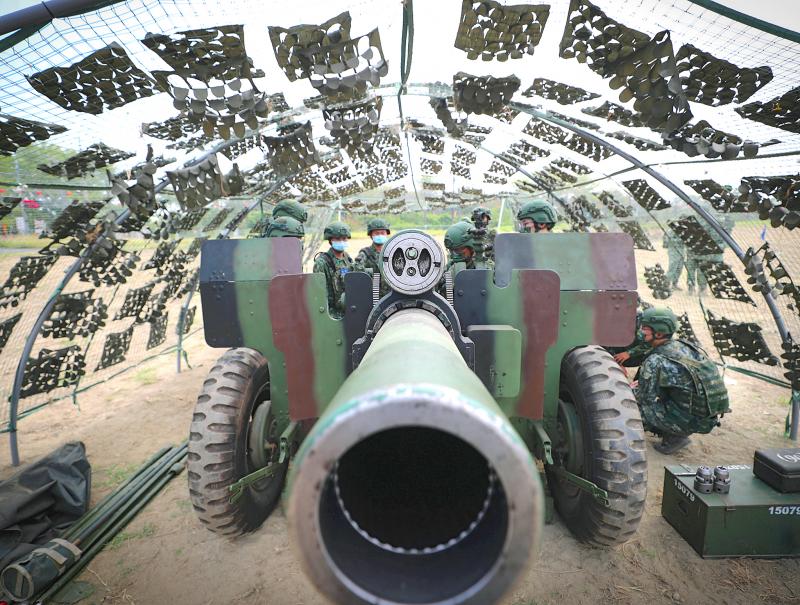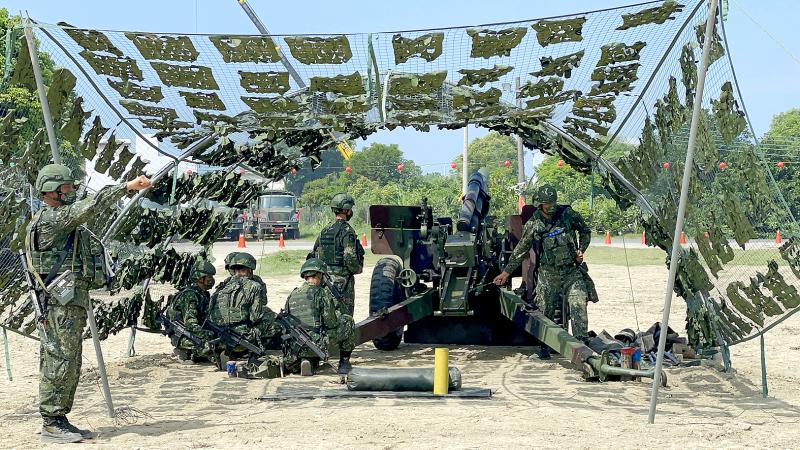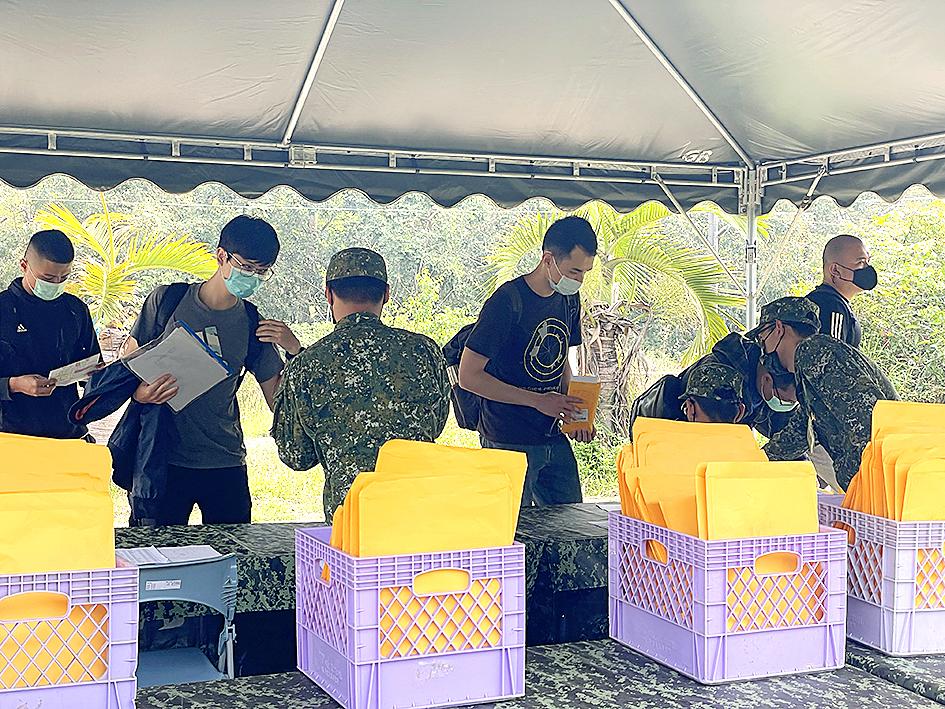In the last couple of weeks Taiwanese have reacted with growing uneasiness to the Russian invasion of Ukraine. A recent poll from the Taiwan Public Opinion Foundation (TPOF) shows that clear majorities think the invasion unjustified and support Taiwan’s participation in the western sanctions on Russia.
A poll by the ruling Democratic Progressive Party (DPP) showed that 65 percent of the populace was willing to fight for the nation. Clearly Ukraine’s experience is reshaping the public’s view of defense. The moment is here to be seized, if the government will move on it.
In “The View of Ukraine from Taiwan: Get Real About Territorial Defense,” retired Taiwan Admiral Lee Hsi-min (李喜明) and Michael Hunzeker argue for a territorial defense force organized along eastern European lines.

Photo courtesy of the 203rd brigade artillery battalion
TERRITORIAL DEFENSE FORCE
They call for “creating a permanent territorial defense force that will operate as a stand-alone service under the aegis of the Ministry of National Defense.” The article focuses on the territorial defense as a paramilitary response, with excellent suggestions for organization.
The idea of a stand-alone service is particularly important. Current arrangements are completely unsatisfactory.

Photo: Wan Yu-yan, Taipei Times
In the eastern European countries, Lee and Hunzeker point out, civil defense efforts are focused on fostering territorial defense capabilities with an eye to denial of political control by building the capabilities to carry on an insurgency.
Unfortunately, they observe, Taiwan has (wrongly) opted for creating a reserve force that mirrors the US model of an operational reserve. What is needed, they contend, is a force oriented on territorial insurgency, on denial of political and social control to the invader, as in Ukraine.
Civil defense is particularly urgent because Taiwan has none of the advantages of eastern Europe with its broad spaces and shared land borders. It cannot trade space for time.

Photo: Wan Yu-yan, Taipei Times
Supplies to Taiwan will have to travel in ships, and that will not happen if China has control of the air over the island sufficient to permit the landing of troops. We cannot assume that the Chinese will be as incompetent as the Russians and let a Taiwan insurgency constantly re-equip itself from captured weapons.
Readers might argue that insurgents can retreat into Taiwan’s rugged mountains when the cities are occupied. The Chechen insurgency eventually did that too. It is now a memory. If a Taiwan insurgency is forced to operate out of the mountainous regions of New Taipei City’s Wulai District (烏來) or Chiayi County’s Alishan, it has probably already lost.
In addition to vast space for retreat and reorganization and the realistic possibility of re-supply, Ukrainian insurgents have another “advantage” — the fighting against the Russian seizure of areas in southern Ukraine has produced a body of experienced instructors to train paramilitary groups.
One Ukrainian trainee observed in a Radio Free Europe report: “we all know what happened in 2014. There was no military recruitment. No one knew what to do. The officers were idiots.”
Many died needlessly, he said, because volunteers lacked training in simple first aid techniques like applying tourniquets.
That is the situation we will face in Taiwan if/when Beijing attacks.
EXPANDED CONSCRIPTION
It is hard to see how expanded conscription will address any of the intractable problems of space and supply, or gift Taiwan with the infrastructure and organization it needs. Worse, while extending conscription is under discussion, upgrading military training and preparation is not. Ex-conscripts laugh at the current conscription program.
An acquaintance did his four months in an anti-tank unit. They were able to shoot six bullets at a time for weapons training, but their anti-tank training did not involve any firing of real weapons at targets. They received one day of first aid training, absolutely minimal. Most of the younger males I know report similar experiences.
The current conscription program is geared at checking boxes on a list, not in providing recruits with realistic training as insurgents. Extending it without massive expenditures to upgrade the experience will be worse than useless.
Extended conscription is just another Taiwanese-style pretend solution adopted because it will minimally inconvenience society, especially businesses. What is necessary is a deeper and more meaningful conscription that offers intense, realistic training that embraces hundreds of thousands of young people from across society.
Supporting a territorial defense force will require prepositioning in Taiwan of thousands of man-portable surface-to-air missile and anti-tank systems (which can be used against landing ships), as well as massive quantities of other weapons and ammunition and ready meals, for realistic training.
Lee and Hunzeker call for the construction of numerous armories at the local level, so that when the paramilitary forces are mustered, they can immediately be supplied with weapons.
We have this tradition in Taiwan. It used to be that on Kinmen and Matsu the locals were permitted to keep guns at home for civil defense. The ammunition was stored elsewhere. During 228, Taiwanese youths trained during the Japanese occupation were able to get weapons from Japanese armories and keep public order. Anyone who has looked at surviving 19th century homes and warehouses in Taiwan has probably noted the guns slits and turrets.
GETTING INTO THE WEEDS
Piles of shiny weapons are important. But civil defense programs in Taiwan should involve the entire society in support. Plenty of gardeners could be called on to teach Taiwanese the fine art of growing victory gardens in Taiwan’s urban jungles. First aid skills should be taught to a broad segment of the population. Programs in learning how to deal with the injured in the rubble of buildings should also be instituted (handy for quakes and typhoons).
In time of war, local implementation of civil defense planning falls on the neighborhood captains under the aegis of the National Policy Agency (NPA). It’s time that the island instituted an annual one-day national holiday to practice civil defense at the local level, and give the police and local officials hands-on experience with carrying out plans, and the public practice with complying.
In Ukraine volunteer programs on weekends taught needed skills. In Taiwan there is a local structure that could easily be adapted for that function: local community colleges, hosted at local schools and activity centers.
President Tsai Ing-wen’s (蔡英文) administration is moving slowly, probably because a number of bureaucracies are involved. The All-out Defense Mobilization Agency (全民防衛動員署) is first the responsibility of the Ministry of Defense, which mobilizes the reserves. The Ministry of the Interior is responsible for civil defense, while the NPA is responsible for implementing the civil defense plan. Police are massively overworked, and the NPA already has its hands full with the COVID response.
There are civil defense programs and training for NPA officials (a massive four hours annually!), but if you copy and paste the Chinese characterse for civil defense “民防” in to YouTube, you will see all sorts of things uploaded to fulfill the requirements of civil defense training, including civil defense officials doing karaoke at a civil defense training session. Judge for yourself how useful and relevant the training is. Much of it, I am told, is aimed at police activities such as combating drug and human trafficking, rather than civil defense.
The public is ready. The government must lead.
Notes from Central Taiwan is a column written by long-term resident Michael Turton, who provides incisive commentary informed by three decades of living in and writing about his adoptive country. The views expressed here are his own.

Towering high above Taiwan’s capital city at 508 meters, Taipei 101 dominates the skyline. The earthquake-proof skyscraper of steel and glass has captured the imagination of professional rock climber Alex Honnold for more than a decade. Tomorrow morning, he will climb it in his signature free solo style — without ropes or protective equipment. And Netflix will broadcast it — live. The event’s announcement has drawn both excitement and trepidation, as well as some concerns over the ethical implications of attempting such a high-risk endeavor on live broadcast. Many have questioned Honnold’s desire to continues his free-solo climbs now that he’s a

Lines between cop and criminal get murky in Joe Carnahan’s The Rip, a crime thriller set across one foggy Miami night, starring Matt Damon and Ben Affleck. Damon and Affleck, of course, are so closely associated with Boston — most recently they produced the 2024 heist movie The Instigators there — that a detour to South Florida puts them, a little awkwardly, in an entirely different movie landscape. This is Miami Vice territory or Elmore Leonard Land, not Southie or The Town. In The Rip, they play Miami narcotics officers who come upon a cartel stash house that Lt. Dane Dumars (Damon)

Francis William White, an Englishman who late in the 1860s served as Commissioner of the Imperial Customs Service in Tainan, published the tale of a jaunt he took one winter in 1868: A visit to the interior of south Formosa (1870). White’s journey took him into the mountains, where he mused on the difficult terrain and the ease with which his little group could be ambushed in the crags and dense vegetation. At one point he stays at the house of a local near a stream on the border of indigenous territory: “Their matchlocks, which were kept in excellent order,

As Taiwan’s second most populous city, Taichung looms large in the electoral map. Taiwanese political commentators describe it — along with neighboring Changhua County — as Taiwan’s “swing states” (搖擺州), which is a curious direct borrowing from American election terminology. In the early post-Martial Law era, Taichung was referred to as a “desert of democracy” because while the Democratic Progressive Party (DPP) was winning elections in the north and south, Taichung remained staunchly loyal to the Chinese Nationalist Party (KMT). That changed over time, but in both Changhua and Taichung, the DPP still suffers from a “one-term curse,” with the